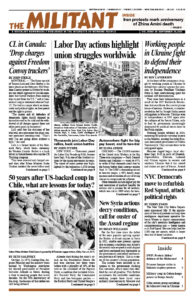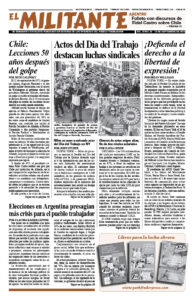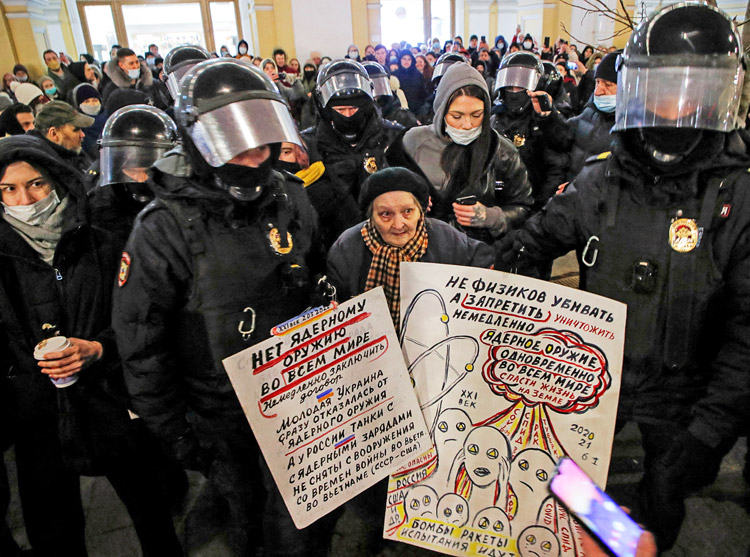At the heart of the courageous struggle by working people in Ukraine to defend their country against the invasion by Russian President Vladimir Putin is their centurieslong quest for national self-determination.
They won their independence as a result of the 1917 Bolshevik Revolution that overthrew the czarist prison house of nations. However, a counterrevolution led by Joseph Stalin meant subjugation to Moscow. Ukraine won its independence in 1991 again after the collapse of the Soviet Union, only to find its government increasingly dominated by political forces loyal to the Putin regime.
Working people rebelled in 2014, mounting the popular uprising known as the Maidan, ousting the hated Russian-dominated government of Viktor Yanukovych. They are not about to be subjugated again.
Moscow staged bogus local elections Sept. 8-10 in parts of Donetsk, Zaporizhzhia, Kherson, Luhansk and Crimea regions in eastern and southern Ukraine that it has seized and claims are part of Russia. Armed guards often stood over the voting. To give a fig leaf of credibility to the sham, a small selection of Russian opposition parties were permitted to run. Moscow announced that the candidates of Putin’s United Russia party were “elected.”
What took place “has nothing to do with normal elections,” Baska, a resident of Melitopol, told CNN. She has refused to leave the Moscow-ruled city, but says she thinks Putin intends “a complete replacement of the local population [by Russians].” Many residents in occupied regions have fled or been forced to use Russian passports.
The fake vote was timed to coincide with Russian regional and municipal elections. In Moscow, an ally of Putin was elected mayor, but only 10% of voters participated. Many who went to vote online found the message, “You have already voted.”
At the same time, Kyiv’s counteroffensive is making slow but steady progress, liberating towns in the south and areas around Bakhmut in the east. Ukrainian forces captured the Boyko Towers, four important oil and gas production platforms in the Black Sea, Sept. 11.
The consequences of the first full-scale land war in Europe since World War II continues to sharpen tensions worldwide, pushing capitalist rulers everywhere to search for new allies and weaponry to defend their national interests.
Putin met Kim Jong Un, the leader of the Democratic People’s Republic of Korea, in Russia’s Far East Sept. 13. Pyongyang is offering ammunition stockpiles that Moscow desperately needs to continue its brutal bombardment of Ukrainian cities. Russian food and fuel supplies could ease shortages in North Korea.
At the same time that Kim is strengthening relations with Putin, the South Korean government has bolstered its military ties with Kyiv, Tokyo and Washington. The Korean Peninsula was divided against the wishes of the Korean people by the U.S. rulers after World War II.
Washington has threatened to tighten its sanctions against the DPRK if Putin’s deal with Kim goes ahead. U.S.-led sanctions against both North Korea and Russia fall hardest on working people.
This week the U.S. military began joint military exercises in Armenia with its armed forces. Earlier this year the government there refused to allow Moscow — its ally for decades — to hold military exercises on their soil.
Ukraine music and art flourish
Ever since Putin’s war began, hundreds of prominent filmmakers, writers and musicians have fled Russia. The contrast with Ukraine couldn’t be sharper, where the defense of national sovereignty is being waged with the enthusiastic participation of the country’s artists.
A surge of creativity in Ukraine has generated hundreds of songs, ranging “from folk-patriotic to the most fashionable” modern genres, Russian music critic Artemy Troitsky told Open Democracy. “A just war inspires creative people, while a vile, dirty, predatory one inspires a depressing feeling,” he said.
Many well-known Russian musicians have spoken out against Moscow’s invasion. Blacklisted by Kremlin authorities, their concerts were banned in the Russian Federation. Unwilling to stay silent, many moved abroad.
Yuri Shevchuk of DDT, one of Russia’s most popular rock bands, has refused to leave the country.
“I have always been against wars, in any country and at any time,” he wrote. “I opposed the wars in Vietnam, Afghanistan, Yugoslavia, Chechnya, Abkhazia, Georgia, Ossetia, Karabakh and Iraq. I am also against the ongoing eight-year war in Donbas and the current military operation in Ukraine.”
Since Shevchuk’s statement was published in 2022, DDT’s performances have been banned.
Many Russians turn their backs on Putin’s efforts to drum up support for the war. “The Witness,” the first full-length movie glorifying Moscow’s invasion, is playing to empty theaters. Other state-backed propaganda movies about Putin’s seizure of Crimea in 2014 have been similar box-office flops. Some older Russians, limited to government-controlled media, tend to go along with Putin’s war. But others are speaking out. Over 200 pensioners across the country have been convicted for opposing the invasion.
“Russia’s tragedy cannot be compared with Ukraine’s, whose fertile lands, its people, its cities, are all being destroyed,” 69-year-old Elena Ivanovo from Novosibirsk told Verstka Media. “The most important thing is that the war ends.”


